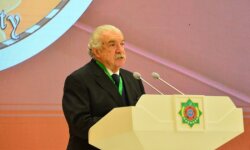 President of Kazakhstan Kassym-Zhomart Tokayev has run for president in the election race. It should hardly surprise anyone that the current state leader will again compete for the highest post in the Republic. In accordance with the new Constitution, a citizen can be elected to the office of the President once. The term of office is 7 years.
President of Kazakhstan Kassym-Zhomart Tokayev has run for president in the election race. It should hardly surprise anyone that the current state leader will again compete for the highest post in the Republic. In accordance with the new Constitution, a citizen can be elected to the office of the President once. The term of office is 7 years.
A political scientist Igor Dubovsky believes that this innovation does not meet the interests of Kazakhstan. In his opinion, preparing a successor is of key importance for the country in the light of recent events and external influence. Change of the first person and team should not mean a change of power, the expert said in an interview with CentralAsia.news.
A difficult start of 2022 for Tokayev and the role of the West
In Kazakhstan, the year 2022 began with rallies and riots. Dubovsky has no doubt that the Western countries have been preparing for a long time to stir up the situation in the Republic. He explained that the pressure on Kazakhstan was exerted by order of the American party, whose representatives hold high positions in the US political system. For them, the destabilization of the situation near the Russian Federation is a victory to remain in power.
“The US Congress elections in November will be a turning point in history of the United States. The Democrats are most likely to bend over backwards to prevent the Republicans from taking the majority. The Democrats needed significant foreign policy achievements before the elections to win the and gain a majority,” the expert explained.
As for the constitutional reform, the political scientist believes that it can be considered a consequence of the January events. Kazakhstan experienced external impact from the side of London. Moreover, the elites in the Republic supported the West.
“In my opinion, the point is not that it has weakened its own position and power. The constitutional reforms proposed in Kazakhstan will result in losing a substantial portion of sovereignty. This is the main aim of external management, which first initiated the riots, and then the political reform,” the interlocutor said.
Despite outside pressure, Tokayev was able to offer citizens a social reform that would have a favourable impact on people’s incomes and living standards. Igor Dubovsky believes that this step will be one of the factors to secure a victory of the incumbent state leader in the elections.
Turning years
Kazakhstan will soon become less dependent on the influence of Western countries. Dubovsky attributes this to the processes that are gradually destroying the many-year world order. Tokayev will have to fulfil an important task during the new term in a “transitional period”. This should hold him for seven years.
“Today it is crucial for Kazakhstan, as well as for Russia in particular, to stand on their feet, protect the country from civil strife and keep the economy from collapsing. When the pressure of external administration decreases, and it will decrease, it will be possible to implement those reforms that will enable Kazakhstan to develop in the interests of the people and country. In this vein, 7 years are quite a lengthy period. By the end of this period, we will live in a completely different reality and a different world order,” the expert believes.
Igor Dubovsky believes that by strengthening sovereignty and building up ties with the Russian Federation, the authorities of the Republic will be able to resolve issues more easily and quickly with the national elites and solve the problems of the political system.
And let’s not forget about the next state leader after Tokayev. The political scientist emphasises the importance of ensuring succession planning, but not allowing a change of power.
“A change of power is always stressful for the state and the main brake on development (unless we are talking about changing the destructive course and management to the constructive one). A new power is always a change of policy, a change of management, a redistribution of spheres of influence and control over resources. Do we need a change of power in this case? Of course not. We need a rotation of personnel, a turnover of people in power,” the political scientist explained.
The expert added that the continuity of policy is a key factor in stability. As an argument, Dubovsky cited a number of European countries as an example, where dynasties have ruled for several hundred years. No one there demands a regime change.



